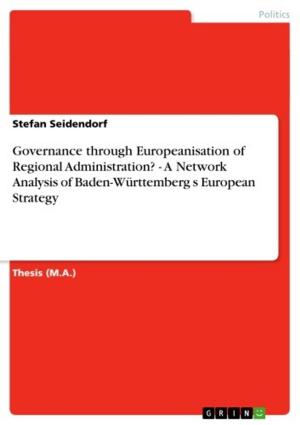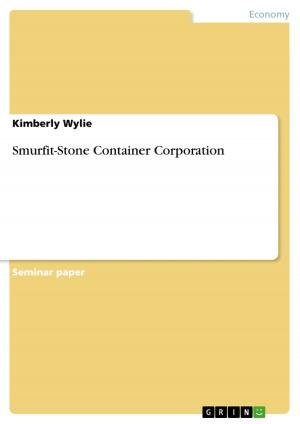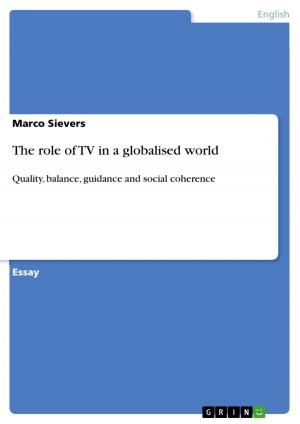How Can We Create the Right Organizational Context to Sell Environmental Sustainability as a Strategic Issue to Top Management?
Business & Finance, Management & Leadership, Management| Author: | Maxime Dessy | ISBN: | 9783640560509 |
| Publisher: | GRIN Publishing | Publication: | March 10, 2010 |
| Imprint: | GRIN Publishing | Language: | English |
| Author: | Maxime Dessy |
| ISBN: | 9783640560509 |
| Publisher: | GRIN Publishing |
| Publication: | March 10, 2010 |
| Imprint: | GRIN Publishing |
| Language: | English |
Diploma Thesis from the year 2009 in the subject Business economics - Business Management, Corporate Governance, grade: 16/20, Solvay Brussels School of Economics and Management, course: Economics, Psychology, CSR, language: English, abstract: This master thesis is divided into three major parts: The first part of my thesis offers the theoretical background on which is based theempirical research I have conducted as part of this thesis. Therefore, this section consists, for a major fraction, in a review of Dutton and her colleagues' work. The section begins with an overview of the literature on issue selling to top management followed by a review of the cognitive categorization theory. Using these two major theoretical sources as well as other relevant findings from the academic literature, I then suggest a general model linking organizational context, top management's interpretation and emotional response to environmental sustainability issues and the subsequent organizational response to those issues. The theoretical background and my individual extension to the existing literature will be the basis for the second part of my work. The second part of my thesis consists in an empirical research based mostly on Dutton and her colleagues' framework that I have extended to the specific issue of environmental sustainability. The goal of this research was to identify the elements of the organizational context playing an important role in the prediction of top management's interpretation of environmental sustainability issues. The research involved two consecutive studies. The first study (Study 1) consisted in few semi-structured and repertory grids interviews to distinguish what elements from the organizational context might help to foresee how top management would interpret an environmental sustainability issue. Hypotheses on how the organizational context could help to predict top management's categorization outcome were then designed according to the results. The second study (Study 2) consisted in a short online questionnaire sent to a large poll of top managers in order to verify the hypotheses elicited by study 1 on how (and which) contextual elements predict top management's interpretation of green issues. The third part of my thesis represents a general conclusion on my final year thesis. It includes my research question, a general overview of the different theories I used to answer it, the different findings and the limitations of my empirical research.
Diploma Thesis from the year 2009 in the subject Business economics - Business Management, Corporate Governance, grade: 16/20, Solvay Brussels School of Economics and Management, course: Economics, Psychology, CSR, language: English, abstract: This master thesis is divided into three major parts: The first part of my thesis offers the theoretical background on which is based theempirical research I have conducted as part of this thesis. Therefore, this section consists, for a major fraction, in a review of Dutton and her colleagues' work. The section begins with an overview of the literature on issue selling to top management followed by a review of the cognitive categorization theory. Using these two major theoretical sources as well as other relevant findings from the academic literature, I then suggest a general model linking organizational context, top management's interpretation and emotional response to environmental sustainability issues and the subsequent organizational response to those issues. The theoretical background and my individual extension to the existing literature will be the basis for the second part of my work. The second part of my thesis consists in an empirical research based mostly on Dutton and her colleagues' framework that I have extended to the specific issue of environmental sustainability. The goal of this research was to identify the elements of the organizational context playing an important role in the prediction of top management's interpretation of environmental sustainability issues. The research involved two consecutive studies. The first study (Study 1) consisted in few semi-structured and repertory grids interviews to distinguish what elements from the organizational context might help to foresee how top management would interpret an environmental sustainability issue. Hypotheses on how the organizational context could help to predict top management's categorization outcome were then designed according to the results. The second study (Study 2) consisted in a short online questionnaire sent to a large poll of top managers in order to verify the hypotheses elicited by study 1 on how (and which) contextual elements predict top management's interpretation of green issues. The third part of my thesis represents a general conclusion on my final year thesis. It includes my research question, a general overview of the different theories I used to answer it, the different findings and the limitations of my empirical research.















